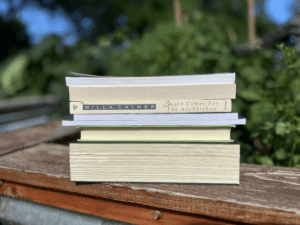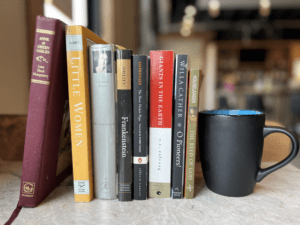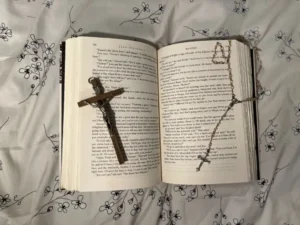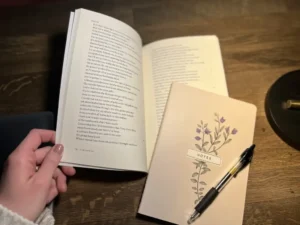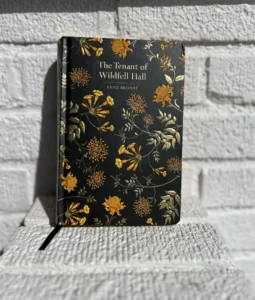Year of the Giver
As we’ve explored the ideas of gift, givenness, and the Giver, we must ask what role we play. I think the answer is to trust that our primary job is to accept and “open” the gift. But receiving is not just a passive endeavor; we must actively participate in it. In doing so, we grow in our capacity to receive. May we all accept God and His gifts for each of us: His word, sacraments, and the people He has placed in our lives. May we always seek Him with the trust that, by doing so, we will know Him. Thankfully, we get to spend all of next year exploring the idea of seeking.
I wonder what Willa Cather would think about her biographies. A famously private person, she destroyed many drafts and personal letters before her death. While this leaves many fundamental questions about her life unanswered, her published works offer undeniable evidence of her religious sensibilities. She often weaves together her characters’ search for meaning with her own. Because the Christian tradition formed Cather’s life, her readers must interpret her writing in that context.
As I snuggled up on the couch, a cup of rose tea steaming in my favorite mug within arms reach and my newborn baby asleep on my chest, I opened the newest Well-Read Mom book selection. I hadn’t had a chance to read any of the book selections during the first half of the year due to moving and welcoming our newest child, so this was a long-awaited joy. It was a new book full of new characters to meet, places to explore, and thoughts to contemplate. I was ready!
Five years ago, I invited myself to a Well-Read Mom group. I was pregnant with my second child, desperate for friends, and craving the intellectual stimulation of real conversation. Little did I know how intensely the friends I met and the characters I encountered would be formative.
I came to my first Well-Read Mom conference this past fall, feeling something like the line in the song, “I Heard the Voice of Jesus Say,” that is: “weary, worn, and sad.” My responsibilities as a wife, mother, and parish ministry worker sometimes weighed heavily on me. Listening to Marcie’s talk about the roots of the Well-Read Mom, including that moment she had in the coffee shop when she was “supposed” to be at her son’s cross-country meet, hit the heart of my experiences and made the tears stream down my face. I had read about this giving moment in Marcie’s life in her book, The Well-Read Mom, but I loved hearing about it again while sitting with a couple of hundred women in the audience, sharing that moment of understanding.
The funny thing about motherhood is that, before entering this state of life, one cannot possibly grasp the magnitude of the undertaking. No matter how many well-written parenting books we read, no matter how many emphatic relatives opine on this or that aspect of child-rearing, no matter how “prepared” one feels to embark on the journey, the inescapable truth is—from the exalted heights of all-encompassing joy and rapture to the anguishing depths of heartache and desolation—we are all hopelessly unprepared for what lies across the great divide between maidenhood and motherhood.
When we read literature, we consider hard questions. What should the character have done? What would I do in his situation? Which character do I want to emulate? From what must I repent? Over and over again, Well-Read Mom offers us beautifully challenging books that force us to consider these questions.
Each time I pick up a new novel, I am struck by how difficult it can be to acclimate myself to the unaccustomed literary landscape. Familiarizing oneself with new characters, settings, and themes can be challenging. Additionally, writing styles can be jarringly different from one author to the next, and the dissimilarities can leave us feeling dizzy, confused, or disoriented. As I trudged along through the sleepy and slow-moving opening chapters of Willa Cather’s Death Comes for the Archbishop, I felt disengaged and subsequently unmotivated by this selection—so foreign to my literary sensibilities and typical longings for witty banter and intriguing plotlines. Yet, as the novel serenely unfolded, I realized that this series of quiet, almost picturesque vignettes was a disarming invitation to examine the unforeseen depth of a simple yet moving, all-encompassing surrender to the Divine Will.
Anne Bronte and Charlotte Mason were near contemporaries. When Mason was six years old, Tenant was published, so it isn’t surprising that the two would both be concerned with character formation in the same Victorian British way. Bronte doesn’t shy away from exploring the ideas of virtue and vice and even tells us in her preface, “I wished to tell the truth, for truth always conveys its own moral to those who are able to receive it” (5). As she warned, this statement made the book a bit heavy-handed in parts and detracted from my “immediate pleasure” in reading. Yet the characters are so beautifully drawn that they come alive on the page. Examining this book through the lens of Mason’s “Way of the Will” gives us two characters who perfectly embody each side of the line.
One of the most cherished aspects of the Well-Read Mom is how it continually introduces me to new books. Not only have these works increased my own understanding, but they have also provided me with invaluable wisdom to bequeath to my children. What a joy it is to discover an ever-growing treasure trove of literary works that will serve my daughters (and sons!) as they navigate young adulthood, discern vocations, consider marriage, and examine a host of other weighty life questions!


